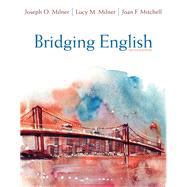This title is only available as a loose-leaf version with Pearson eText.
Comprehensive, theoretically sound, and practical, Bridging English captures what students need to know in order to enter today’s secondary English classrooms with confidence, while engaging students with purposeful, dynamic lessons. Appreciated as more than a general introduction to English education, this is a textbook that students take from their college coursework into their own classrooms as the anchor reference source in their professional libraries.
While clarifying and expanding on the information in the previous editions, this new edition addresses new developments in the field of English education, of education generally, and of the culture, particularly issues relating to today’s diverse students, mounting pressures of accountability, and the use of technology in teaching and learning. Each chapter presents conceptual frameworks, a multitude of tested teaching activities, and invitations to reflect on both. Included are chapter organizers, numerous boxed figures, tables, teaching activities, invitations to reflect, and an exhaustive index. The result is a book that is easily accessible for the new teacher just building an instructional foundation, and for the established teacher searching for new ways to enliven the classroom.
0134197968 / 9780134197968 Bridging English, Pearson eText with Loose-Leaf Version -- Access Card Package 6/e
Package consists of:
0134198166 / 9780134198163 Bridging English, Pearson eText -- Access Card
0134204034 / 9780134204031 Bridging English, Loose-Leaf Version








